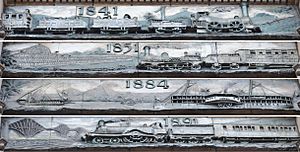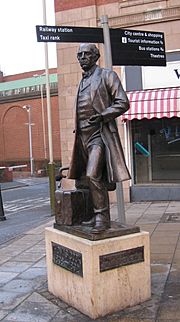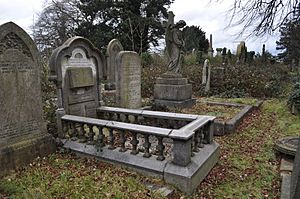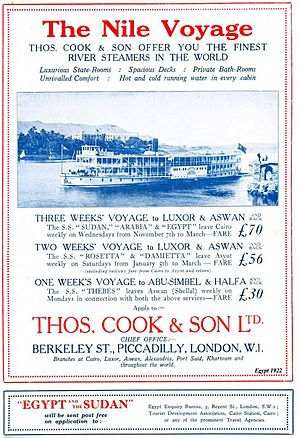Thomas Cook facts for kids
Quick facts for kids
Thomas Cook
|
|
|---|---|
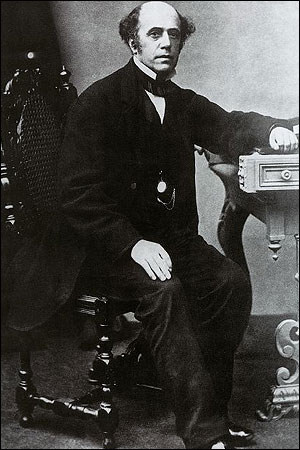 |
|
| Born | 22 November 1808 |
| Died | 18 July 1892 (aged 83) Knighton, Leicester, England, UK
|
| Nationality | British |
| Occupation | Founder of Thomas Cook & Son |
| Organization | Thomas Cook & Son |
Thomas Cook (born November 22, 1808 – died July 18, 1892) was an English businessman. He is famous for starting the travel company called Thomas Cook & Son. He helped make it easier for many people to travel.
Contents
Early Life and Beliefs
Thomas Cook was born on November 22, 1808, in a village called Melbourne, Derbyshire. His parents were John and Elizabeth Cook.
When he was 10, Thomas started working. He helped a local gardener and earned a small amount of money each week. At 14, he became an apprentice to his uncle. For five years, he learned how to make furniture as a cabinet maker.
Thomas Cook was raised as a strict Baptist. In 1826, he became a Baptist missionary. He traveled around, sharing his beliefs and sometimes working as a cabinet maker.
In 1832, Cook moved to Market Harborough. He was inspired by a local minister and decided to support the temperance movement. This movement encouraged people to avoid alcohol. Thomas organized meetings and parades to promote this idea.
On March 2, 1833, Thomas Cook married Marianne Mason. Their son, John Mason Cook, was born in 1834. Thomas Cook passed away in 1892 and was buried with his wife and daughter in Welford Road Cemetery, Leicester.
Cook's First Trips
Thomas Cook got the idea for organized trips while walking to a meeting. He wanted to help people travel easily. In 1841, a new railway line opened. Cook decided to arrange a special train trip.
On July 5, 1841, he took about 500 people on a train. They traveled from Leicester Campbell Street railway station to Loughborough. Each person paid one shilling for the round trip. This trip was for a rally supporting the temperance movement. Many people think this was the world's first organized railway excursion. However, other groups had organized similar trips before this.
Cook continued to organize more trips. In 1845, he arranged a trip from Leicester to Liverpool. The next year, in 1846, he took 350 people on a tour of Scotland.
In 1851, he helped 150,000 people travel to the Great Exhibition in London. This was a huge event showing off new inventions. Four years later, he planned his first trip outside of Britain. He took two groups on a "grand circular tour" of Belgium, Germany, and France. The trip ended in Paris for another exhibition.
A statue of Thomas Cook stands outside Leicester Railway Station. It was put there in 1994 by his great-great-grandson, also named Thomas Cook.
Thomas Cook & Son Company
In 1865, Thomas Cook opened an office in London. This office was also a shop. It sold useful items for travelers. These included guide books, luggage, and even telescopes.
In 1872, Thomas Cook partnered with his son, John Mason Cook. They changed the company's name to Thomas Cook & Son.
Thomas and his wife also ran a small hotel above their office. This hotel followed their temperance beliefs. They made their business even better by introducing "hotel coupons" in 1868. Travelers could buy a book of these coupons. Each coupon could be used for a meal or a night's stay at hotels on Cook's list.
Thomas Cook retired at the end of 1878. His son, John Mason Cook, took over the business. Thomas Cook moved back to Leicester and lived there until he passed away in 1892.
Thomas Cook's Impact on Travel
Thomas Cook was a leader in creating modern tourism. He made it possible for many more people to travel. He developed several new ideas that changed travel forever.
First, he created "circular tickets" for railways. These tickets let people travel by train for a certain number of days. They could follow set routes across Italy. Second, Cook designed "hotel coupons." These coupons worked with the train tickets. Travelers could use them to pay for lodging and meals at specific hotels.
Finally, he introduced "circular notes." These were like special money for travelers. They could be exchanged for local money (Italian lira) at hotels and banks. This made it much easier to travel within Italy.
Cook's new ideas helped the Italian economy. More tourists meant more money for the country. His coupon system became very popular. Thanks to this system, even middle-class people could travel more often and more easily.
|
See also
 In Spanish: Thomas Cook para niños
In Spanish: Thomas Cook para niños
 | Charles R. Drew |
 | Benjamin Banneker |
 | Jane C. Wright |
 | Roger Arliner Young |


